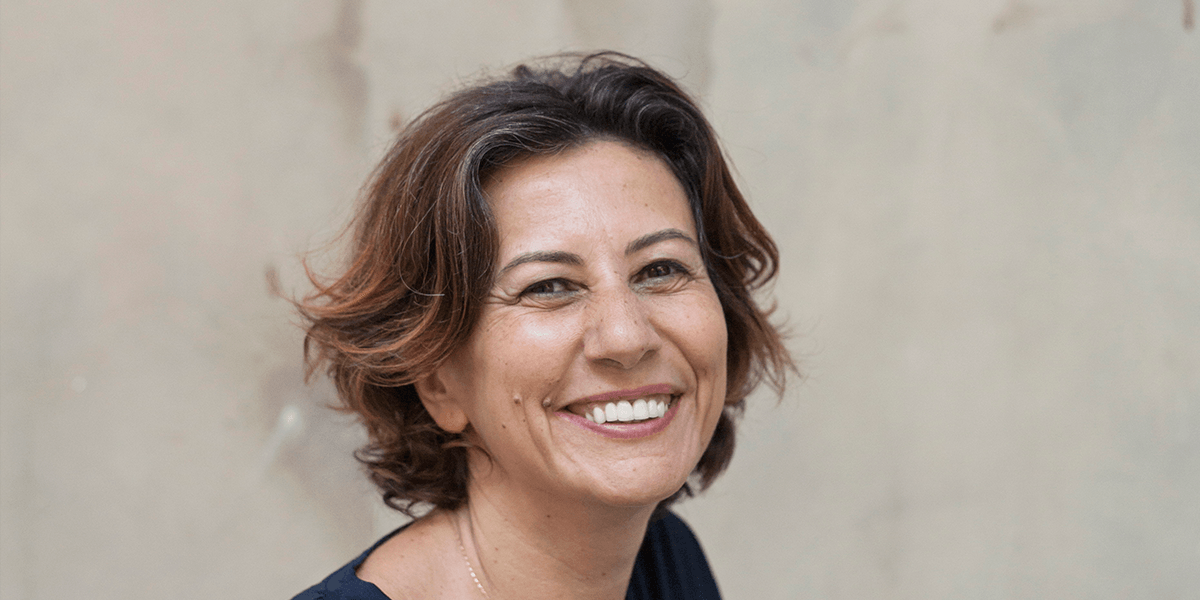
Courtesy of Tamara Abdul Hadi for Malala Fund
Nayla Fahed is president and co-founder of Lebanese Alternative Learning, an organisation that uses digital learning platforms to reach vulnerable communities.
Nayla Fahed is president and co-founder of Lebanese Alternative Learning, an organisation that uses digital learning platforms to reach vulnerable communities. Her Education Champion Network grant focuses on expanding a STEM e-learning programme to Syrian refugee girls in public schools and non-formal learning centres in Lebanon. By working with the Lebanese government to deploy the e-learning platform, Nayla will reach many more students.
Read our interview with Nayla to learn more about her background and work.
MALALA FUND: How does a French literature professor at the University of Beirut end up developing STEM education technology and online learning platforms as solutions to ensuring Syrian refugee children are motivated to learn and stay in school.
NAYLA FAHED: My background is French literature. For 25 years I taught French literature at Saint Joseph University in Beirut. And I used also work with teachers, I used to capacity building for teachers, french teachers. And I used to work in the science education faculty.
MALALA FUND: Nayla used to volunteer to teach at a children’s cancer hospital once a week when she got the idea to develop e-learning platforms. She was using the university learning system, putting content to respond to the children’s needs for language and science, so that they could work anytime from home or at work, etc. Nayla and her colleagues were working with middle school children and when the academic year ended she realized this form of learning could respond to a greater need. One of the initial funders of her project said,
NAYLA FAHED: She told us, "Please don’t stop, there are many more students in need than the 20 students you are working with. You are having e-learning platform, it is scalable, there are plenty of schools in need.”
MALALA FUND: Nayla’s goal is to give digital resources, motivate children, and keep them in school and avoid children from dropping out. She hopes to help students acquire the level of education needed to enter formal education. She sees her work as complementary to formal education not a replacement.
NAYLA FAHED: This is how we decided to fund an NGO and we funded Lebanese Alternative Learning NGO and we gave it the name Tabshoura we decided that our platform name would be Tabshoura. Tabshoura means — I never know how to pronounce it right — "choke.” C-H-A-L-K.
MALALA FUND: Chalk!
NAYLA FAHED: Chalk! Okay (laughs). The idea of Chalk was that we didn’t really want to replace school, we were sort of a continuity of school.
I was working with a teenage girl and she was very resistant at first. She didn’t want to work. She told me she likes makeup and she wants to be a makeup artist and she didn’t really like to learn sciences and etcetera. And I introduced her, I gave her a laptop — we worked with another NGO and they give away laptops, refurbished computers — so I gave her a laptop and we worked together on (muffled). She was very excited to learn how to use the laptop and by using the computer she was introduced to science and she was in fact very, very good at math. Really, she was really skilled at math. She thought, you know the social prejudice that girls cannot do math, and she discovered that she was very good in math. And she called me one day and she asked me if I could come on Sunday because Sunday is very boring at the hospital because there are no doctors, no nurses and please can you come and do some exercise on the computer I'd like to do some work on the computer.
I said, "I’m sure if this girl has this, I’m sure other will also benefit from that.”
MALALA FUND: Nayla translated her work doing e-learning in hospitals to address education for Syrian refugee children. Currently Tabshoura is working with 2,000 children but by the end of the year will be working with 10,000 and will have access to all Lebanese public schools.
NAYLA FAHED: One of our main challenges was the internet connection. And we are currently working with success of three offline connections. So we have what we call Takshura in a box.
And you can put it in your pocket. It can work on solar power if you don’t have electricity. We have our content uploaded to the box. The box becomes a server and the server can connect 20 computers and they can work offline anyway. So you can have it in your pocket and take it out and connect to your phone, your tablet your computer. And you connect it to the box we are also working with two English entities who develop what now they call mobile systems it means looking computer like an application it’s a functionality of a learning system on a computer but it’s used like an application but it’s used offline. We have three potential solutions but we are working on finalizing them. This will allow us to go anywhere in the deprived areas and to give away the box and it’s a very low-cost solution because the box for all the content, it’s just $150.
This is what we will be using in the Malala project in all of the schools we will be working with we will be using, we will put all of the content for the Malala project, which is scientific content, we will put that on the box. We will have one Malala box with all the scientific content.
MALALA FUND: Tabshoura demonstrates how technology in education is not only motivating and exciting for students but revolutionary. She provides a model that can be applied and scaled in various contexts demonstrating that innovation to education is crucial.
NAYLA FAHED: The idea is to introduce a notion, the student must work/try things, a situation a small problem to solve or small issue to think about. And starting with this, we give activities. All the activities have feedback and the knowledge comes from trying and having the feedbacks. It will tell you "yes this is right because you did so and so and” or no it’s wrong "what about/you didn’t notice that or what about” it’s always positive feedback whether it’s right or wrong. And the idea is to connect the notion to real-life situation, even if it’s mathematics.
And a lot of girls told me, "No, but this is the only possibility we have.” So the idea or the challenge was we want to introduce youth, for those who want to go back to school we want to introduce them to formal education. For those who have a vocational education, we want them to have better job opportunities through computers, they can learn how to do accounting, they can learn how to program a budget, they learn how to use a computer and to get other job opportunities.
To learn more about the Education Champion Network as well as other champions supported by Malala Fund, go to malala.org/champions.
